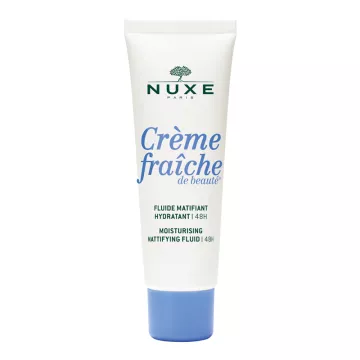
What are the signs of dehydrated skin?
Skindehydration manifests itself in a variety of ways, each of which can significantly affect your appearance and comfort. Warning signs usually include a feeling of tightness, especially after cleansing, dull skin, visible fine lines of dehydration, and a sensation of irritation or increased sensitivity. Recognizing these signs is crucial to adapting your skincare routine and preventing further damage.
How important is hydration for the skin?
Hydration is essential for maintaining theintegrity of the skin barrier, which helps protect the skin against environmental aggressors such as pollutants and pathogens. Good hydration also contributes to more supple, luminous and youthful skin. It helps reduce the appearance of fine lines and wrinkles by maintaining the skin's volume and elasticity.
How do I moisturize my skin effectively?
For effective moisturizing, we recommend using products adapted to your skin type. Ingredients such ashyaluronic acid, glycerin and ceramides are particularly effective in attracting and retaining moisture. It's also essential to incorporate nourishing oils, such as jojoba or almond oil, which strengthen the skin's lipid barrier. Don't forget to moisturize your skin morning and night after cleansing to optimize the benefits of moisturizing products.
What are the best types of moisturizing products?
The choice of moisturizing products depends largely on your skin type. Rich creams are ideal for dry skin, while lotions or gels are better suited to oily or combination skin because of their lightness and ability to moisturize without clogging pores. For intense hydration, moisturizing masks can be used several times a week to complement your regular routine.
Are there foods that promote skin hydration?
Yes, diet plays a significant role in skin hydration. Foods rich in omega-3 fatty acids, such as oily fish, walnuts and chia seeds, are excellent for nourishing the skin from within. Water-packed fruits and vegetables, such as cucumbers, watermelon and oranges, also contribute tooverall hydration and provide essential antioxidants that protect the skin from oxidative damage.
How does climate influence skin hydration?
Climate plays a crucial role in your skin's hydration levels. In dry or cold climates, the air can dehydrate the skin, leading to increased dryness and flaking. It's essential to adapt your skincare routine to these conditions, opting for richer moisturizers and using hydrating mists throughout the day to maintain optimal hydration levels.
What's the difference between moisturizing and nourishing the skin?
Hydrating the skin means increasing its water content to make it suppler and smoother. This is generally done with lotions and serums containing humectants such ashyaluronic acid. Nourishing the skin, on the other hand, involves providing essential lipids and oils to strengthen the cutaneous barrier and prevent moisture loss. Nourishing products often contain vegetable oils and butters such as shea butter.
Is it possible to over-moisturize your skin?
Yes, it is possible to over-moisturize your skin, especially if you use very rich products that can clog pores and cause acne. It's important to choose products suited to your skin type and not to apply large quantities of creams or oils. Over-hydration can also make skin lazy, reducing its natural ability to regulate moisture.
How does age affect skin hydration?
With age, skin naturally loses its ability to retain moisture due to reduced collagen and elastin production, as well as changes in skin lipid composition. Older people may find that their skin becomes drier and less elastic. It is therefore important to intensify moisturizing care and use specific products containing anti-aging agents to support long-term skin health.
What daily gestures help keep skin hydrated?
To maintain good skin hydration, it's advisable to adopt certain daily gestures: